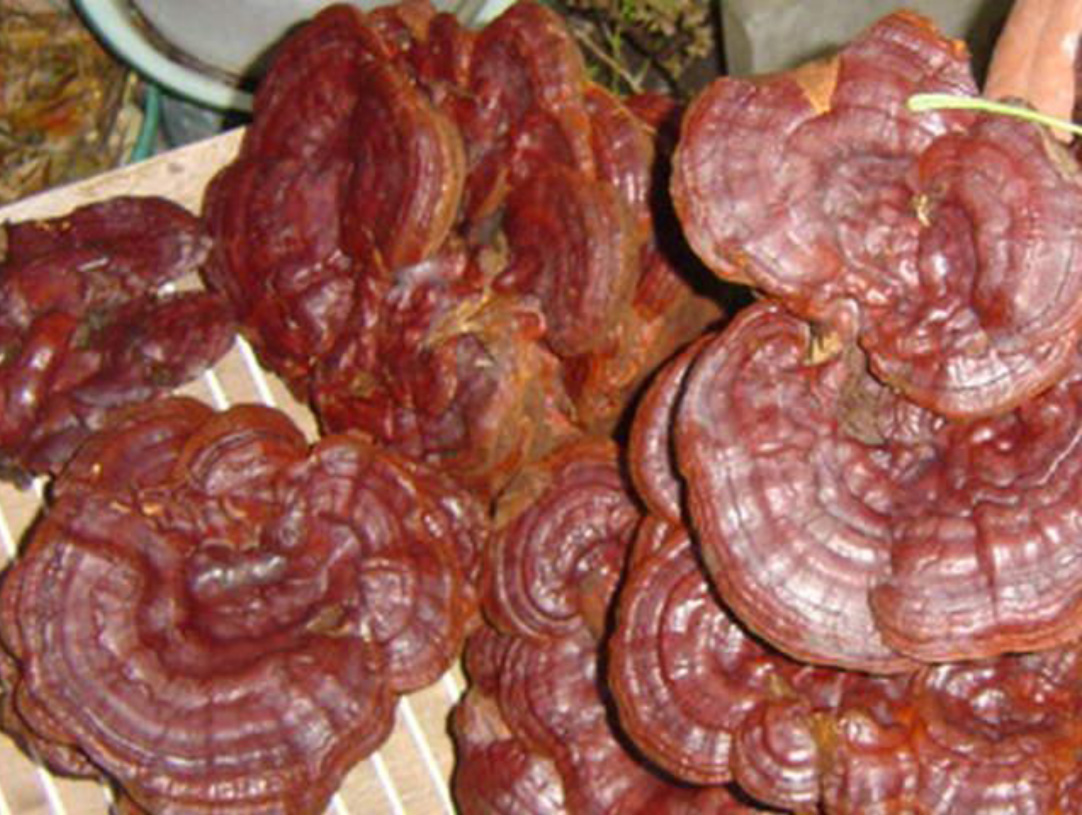The Benefits of GANODERMA LUCIDUM

Now re-discovered by the Western World
For over 2000 years Reishi mushrooms (Ganoderma Lucidum) have been recognized by Chinese medical professionals as a valuable remedy.
Its Chinese name Lingzhi, means "spiritual potency". Reishi mushrooms are regarded by the Chinese as the "Medicine of Kings". Dr. Shi-Jean Lee, the most famous Chinese medical doctor of the Ming Dynasty, strongly endorsed the effectiveness of Reishi in his famous book, Ban Chao Gang Moo ("Great Pharmacopoeia"). He stated that the "long-term taking of Reishi (Lingzhi) will build a strong, healthy body and assure a long life."(2)
"The Medicine of Kings" and its benefits
For the Nerves:
Reishi mushrooms have been traditionally recommended by Chinese and Japanese herbalists for insomnia due to their "sleep-promoting factor".(1) Long-term use causes a significant promotion of slow wave sleep1. Reishi mushrooms are prescribed in China for a number of psychiatric and neurological afflictions, including diseases involving the muscles, anorexia, and debility following lengthy illnesses.(3)
In Japan, the dried "mycelium" of Reishi the root-like body that produces mushrooms has been found to be highly effective in the treatment of neuroses caused by "environmental stress".(1) In addition, in an eight-month study of Alzheimer’s disease, patients taking a Reishi mycelium product demonstrated significant improvement.
In China, Reishi is used for its muscle relaxing and analgesic (pain-inhibiting) effects. In one study, Reishi alleviated anxiety in 18 of 20 patients after four months’ use. It was concluded that the mushroom has an essentially "calmative function", but is neither a narcotic nor a hypnotic.
Immune System:
Ganoderma Lucidum contains high concentration of Organic Germanium, Polysaccharides and Triterpenes. These active components are proven to strengthen our immunity cells and improve our immune system.
Cardiotonic:
For centuries, Reishi has been known as a cardiotonic herb. It was prescribed routinely to those with a "knotted and tight chest" symptoms consistent with both stress and/or coronary artery disease-related angina. Researchers in China found that Reishi improved the bloodflow and lowered oxygen consumption in the heart muscle.(3) Similar results were also found by Japanese scientists.( 1,4 ) They found that Reishi contains ganoderic acids (which belong to agroup of natural substances called "triterpenes" ) which lower high blood pressure, lower cholesterol, and inhibit platelet aggregation (the clumping together of blood cells), which can lead to heart attacks and other circulation problems.
In a six-month clinical trial performed in a university hospital in Tokyo, nearly half (47.5%) of 53 hypertensive patients lowered their blood pressure by 10-19 mmHg, and 10% of the subjects dropped their pressures 20-29 mmHg (both systolic and diastolic readings) after taking Reishi extract.1 Similar results were observed in a Chinese clinical trial without any side-effects. .(1) Another large Reishi study in China found that low density lipoprotein (LDL the harmful cholesterol) levels dropped in 68% of 90 patients following only one to four months of Reishi use. Recently, Russian scientists have taken an interest in Reishi. They found that in addition to all the cardiovascular benefits mentioned above, Reishi showed a significant preventive and therapeutic action against plaque build-up ("plaque" is a fatty goo which is comprised of a combination of oxidized cholesterol, calcium, and degenerated white blood cells ["foam cells"]. It is deposited on the walls of arteries which restricts blood flow by narrowing the passage within arteries resulting in atherosclerosis).
Cancer:
Studies of Reishi in cancer research ha ve been largely conducted in Japan, where Reishi was scientifically proven to have an anti-tumor effect. This research has continued in Korea, Japan, and China.
An example of Reishi’s cancer-fighting potential occurred in the summer of 1986. A 39 -year old Japanese woman approached Dr. Fukumi Morishige, M.D., Ph.D, a renowned Japanese surgeon and a member of the Linus Pauling Institute of Science and Medicine, for help in treating her lung cancer. It was a complicated case, and she had been refused an operation by several hospitals. Hopeless, she returned home where she found her husband had collected Reishi in the forests. He boiled the mushroom and gave it to her to drink as a tea.
While this was going on, she begged Dr. Morishige to do something for her cancer, regardless of its very advanced stage. From what was evident six months earlier, Morishige was surprised when he found no increase in swelling. Then he looked at her X-rays. Something wasn’t right: her tumor showed as only a trace on the X-ray. When she told him she had been drinking Reishi tea, Morishige operated with great curiosity. He was "astonished" to find only scar tissue, and although cancerous cells remained, they were now benign.
That was the impetus for Dr. Morishige to begin his studies of Reishi as a treatment for cancer especially cases given up as hopeless. Dr. Morishige now believes that Reishi is also an effective cancer preventive. The active anti-cancer constituents in Reishi are called Beta-D-glucan.
Beta-D-glucan is a polysaccharide basically a huge sugar molecule made up of many little sugar molecules chained together bound to amino acids. These intricate sugars stimulate or modulate the immune system by activating immune cells such as macrophage and helper T-cells, as well as increase the immunoglobin levels (immunoglobins are specific types of antibodies) to produce a heightened response to foreign cells, whether bacteria, viruses, or tumor cells.



Cảm ơn rất nhiều!